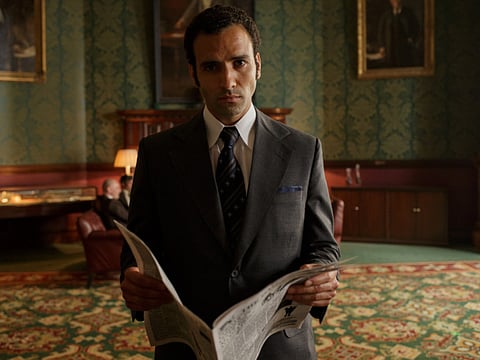‘The Angel’ film review: Ashraf Marwan’s story retold
Story of Egyptian arms dealer, who was believed to be an Israeli spy as well as an Egyptian double agent, is told from an Israeli perspective

On June 27, 2007, a 63-year-old billionaire Egyptian arms dealer living in London tumbled to his death from the balcony of his multi-million pound fourth floor apartment. In death, as in life, Ashraf Marwan left behind many unanswered questions, the most immediate of which were: Did he slip, or was he pushed? If pushed, then by whom? To this day, the case remains unresolved.
The other pertinent question about Marwan’s life: Was he an Israeli agent — or an Egyptian double agent? There’s anecdotal evidence supporting both possibilities.
The much-anticipated Netflix release of The Angel, a movie based on the book The Angel: The Egyptian Spy Who Saved Israel by Israeli author Uri Bar-Joseph, on September 14 has reignited interest in his highly unusual life (and death).
Marwan has been described as ‘the 20th century’s greatest spy’. Perhaps the most interesting detail of his life was that he was the son-in-law of Egyptian President Jamal Abdul Nasser, and special adviser and confidant to his successor, Anwar Sadat. That the son-in-law of the pan-Arab hero Nasser could be a spy for the Israeli regime is unfathomable to many.
The intense Tunisian-Dutch actor Marwan Kenzari (The Mummy, Murder on the Orient Express) plays the lead role and does a great job of portraying the presumably complicated Marwan. The two-hour spy thriller is directed by Ariel Vromen, an Israeli, and had a relatively modest budget of $12 million (Dh44 million). It was shot in London, Bulgaria, and Morocco. Arabic-speaking Israeli Jewish actor Sasson Gabai (Rambo III, The House of Saddam) plays Sadat.
While clearly told from the Israeli perspective, the film is rather sober in the way it conveys the message. And the pace is more Tinker Tailor Soldier Spy, less Jason Bourne. The film leaves the impression that Marwan was a hero not only for Israel, but also for Egypt, in that he sought (no doubt while enriching himself) to bring peace to the Middle East.
Abdul Monem Saeed, one of Egypt’s top national security experts, debunked that theory almost a decade ago, in an interview to CBS’ 60 Minutes in 2009. “It was all part of the plan. He was working for the presidency, and the security establishment of Egypt. How do you build confidence with one of the best intelligence services in the world [a reference to Israel’s Mossad]? You give them the best information that serves your purpose,” he said.
Indeed, the theory of Marwan as a double agent seems to have more merit. While Marwan told the Israelis that the 1973 Arab-Israeli war would begin at 6pm on October 6 — on Yom Kippur, the holiest day in the Jewish calendar — it actually began at 2pm. The deception gave the Egyptian army time to break through Israeli regime defences, cross the Suez Canal, and take back some of the land illegally seized by the regime in the 1967 war.
Though the majority opinion in Israeli security circles holds that Marwan was working for the Zionist state, there are notable exceptions, such as Eli Zeira, who was the head of Military Intelligence during the Yom Kippur War and subscribes to the double-agent theory.
While engaging, in the end, The Angel is the Israeli side of the story, and must be viewed as such.
__
The Angel releases on Netflix on September 14.
Sign up for the Daily Briefing
Get the latest news and updates straight to your inbox


